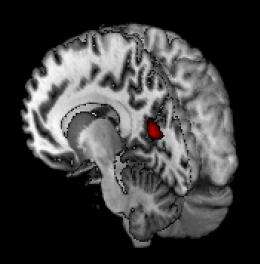Researchers discover 'inner compass' in the human brain

(PhysOrg.com) -- If you have ever lost your sense of direction in an unfamiliar place, then researchers at the Queensland Brain Institute may be able to help.
They have discovered that a person's ability to find their way is learned gradually and that the brain eventually becomes tuned to key landmarks in the new environment.
Dr Oliver Baumann, who led the study, had volunteers learn to navigate to landmarks around a computer-generated maze over several days. He then measured the volunteers' brain activity as they viewed each of the landmarks in isolation.
“The brain acts like a compass, with different neurons firing depending on the direction people think they are heading,” Dr Baumann said.
In the research, published in today's edition of the Journal of Neuroscience, the team used functional magnetic resonance imaging (fMRI) to monitor people's brain activity as they carried out the computerised testing.
The neuroscientists found that a small area in the parietal cortex, located toward the back of the brain, provides critical information about the direction in which a person is heading.
“Here we have evidence in a normal, healthy human population that there is a dedicated cluster of neurons that encodes our sense of direction,” fellow researcher Professor Jason Mattingley said.
“If this brain region is damaged it can severely disrupt a person's ability to navigate in new situations. Such damage is common in stroke and Alzheimer's disease. People haven't made this link before – previously it was just a clinical anecdote.”
He predicted clinicians could eventually use navigational tests, such as those created for this study, as an early probe for the onset dementia.
“Our research suggests that one of the important cognitive functions we should be testing in people with suspected dementia is their sense of direction.”
There might even be scope to test the controversial claim that men's sense of direction really is better than women's.
“It is often suggested that females are poorer at navigation than males, but scientific evidence for this is controversial. Our approach could provide an objective test by revealing whether male and female brains respond differently during navigation tasks,” Professor Mattingley said.
















